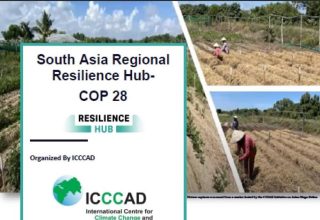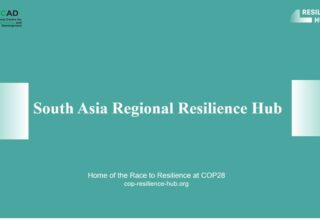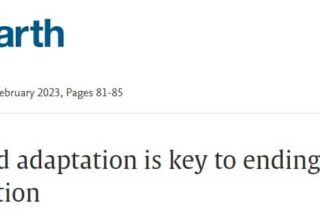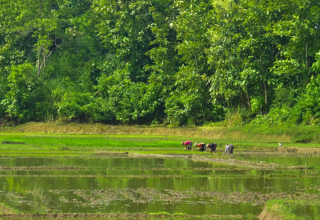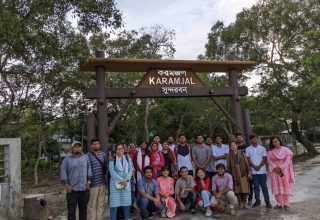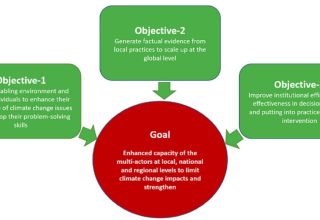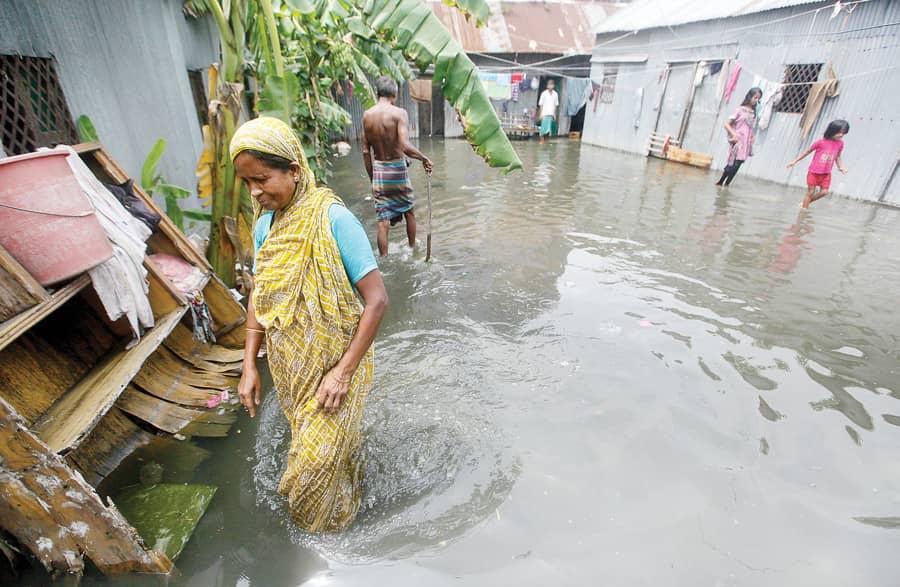
The Regional Resilience Hub at COP26 was home to the Race to Resilience (R2R) campaign connecting people, communities, organizations, and non-state actors driving climate action. The program was led by hubs from around South Asia, Latin America, Africa, South East Asia, East Asia, and the Pacific to bring local experience and knowledge on building resilience to impacts of climate. The International Center for Climate Change and Development (ICCCAD)ran the South Asian Regional Resilience Hub supporting local actors to bring their voices virtually to COP26. The objective of the hub was to share best practices, build collaboration, momentum, new opportunities, amplify messages, and set the direction for future action on adaptation and resilience for COP26 and beyond.
The themes included finance, energy, nature, youth, adaptation and loss and damage, gender, science and innovation, and transport and cities local activists, researchers, scientists, academia, and policy makers working with rural, urban, and coastal groups were invited to participate. The discussions for South Asia focused on adaptation, energy, nature, and cities.
There were plenty of interesting topics discussed which included waste picker networks and support professionals discussing the development of the greenhouse gas emissions calculator 2.1 to measure the contributions of waste pickers to mitigate emissions globally, and Kholi communities from Mumbai describing being caught between land sharks and frequent flooding.
Apart from that, Bangladeshi scientists pointed out that energy and measuring megawatts must go hand in hand with reducing vulnerability. The young professionals present during the discussions shared the clean energy innovation in Biogas plants in the mountain villages of Nepal to build an ecofeminist approach to energy production.
Further during the discussions, NGOs working with women farmers from Maharashtra discussed the value of grassroots action and devolved decision making to build robust locally led adaptation. Women farmers in Maharashtra design, finance, and operationalize practices to produce innovations that reduce the impact of disaster risks to households and communities.
Climate researchers from the region discussed how science, civic diplomacy, technology, and community interventions provide an opportunity for mountain communities across the Hindukush river basin to create a common platform for building resilience against climate change induced water risks.
The case studies from the Indian and Bangladeshi side of Sundarban showed how transboundary research can lead to transformative knowledge and action around gender, livelihoods, natural resource management and social, economic, and ecological relationships.
Asian mega-deltas are a crucial natural resource ecosystems for more than 150 million people. The Living Delta’s Hub supports communities to develop their adaptive capacity through continued knowledge exchange, research, and development programs.
Recent years have witnessed unprecedented high intensity rainfall leading to flooding of major cities across India and the world. Cities in the Global South lack resilient infrastructure and appropriate disaster risk reduction strategies. The discussion explored the feasibility and technicalities in the development of Flood Early Warning Systems.
Outcomes on adaptation amplified support to community organizations, especially women and youth to lead action, set the climate agenda, and shape policies. Organized communities have the collective capability to find solutions, engage with local authority and influence local actors to improve their adaptive strategies. There was a call for more flexible and direct climate finance to support local adaptation, build local capacity, finance loss and damage and combine local knowledge with regional and global knowledge for mobilizing real change.
The discussion on Nature focused on building evidence on nature-based solutions for climate change adaptation. Case studies from Pakistan, India, Nepal, and Bangladesh highlighted how climate finance is used to build resilience and support community adaptation. There was a call for COP26 to agree to increase investment in local level solutions to most vulnerable communities.
The outcomes on the Nature discussions focused on a balanced quantitative and qualitative approach with a better understanding of institutional and knowledge gaps to improve effective implementation, management, and scaling up of nature-based solutions. Participants discussed the need for a holistic understanding of Nbs, including the socio, ecological, and economic attributes and their outcomes for people, climate, and biodiversity and a more effective communication with policy makers to influence integrated policies. There was an emphasis to incorporate traditional and indigenous knowledge and practices in Nbs’ practices and policy and to frame the problem from within the local experience and perspective to help design more effective solutions for local communities and protect biodiversity.
On the topic of Energy, young professionals from Nepal shared their experience of using biogas technology to support women in the mountain communities to improve their living conditions. Bangladesh showcased one of the world’s most extensive domestic solar energy programs and plans to have 40% of the country’s energy from renewable sources by 2041. The ‘Mujib Climate Prosperity Plan’ marks a journey from climate vulnerability to resilience to climate prosperity.
Outcomes from the energy discussion made a call for an integrated & inclusive policy to create an enabling environment for improving solutions that support women and their entrepreneurship endeavors. Participants emphasized the need to measure and support rural households with incentives, accessories, and financial support through community-based systems. They also highlighted the need to coordinate between public and private sectors for technological improvement and effective service delivery. They stressed the need for the transfer of clean and green technology at an affordable cost to address climate change impact along with ongoing capacity development, training, research, planning, and skill development.
South Asia is increasingly urbanized, with a growing number of people living in informal settlements in cities, many of whom are climate migrants. Cumulative effects of poverty compounded with climate risks such as flooding, landslides, and heat stress increases vulnerability and creates food shortages, increasing food prices, and vulnerability. Case studies from waste picker groups in Bangladesh, India, Kenya, France, and Argentina show how the newly developed GHG Emissions tool 2.0 can measure their contribution to the carbon footprint reduction by waste pickers globally.
With increasing numbers of climate migrants and floating populations moving to cities, there is a need for data forces to be able to respond better. The relationship between the formal and the informal city often explains how well the city adapts or does not adapt to a climate crisis. There is a call for urban development plans to consider climate risks to reduce loss and damage and build robust early warning systems backed by science and technology to reduce risks for the most vulnerable parts of the city and the rest.
Originally this article was published on August 1, 2022 at Dhaka Tribune.
Celine d’Cruz started her career working with migrant families living on the streets of Mumbai, through her NGO, SPARC. As a founder member of Slum Dwellers International (SDI) she spent most of her professional time supporting urban poor federations in cities of Africa and Asia. Celine is a visiting researcher with ICCCAD and supported the South Asia region virtual resilience hub at COP26.
Fahad Haider is a Renewable Energy Expert and currently works as a Research Officer at ICCCAD. He completed his Bachelors in Electronics Engineering as an international scholarship recipient at Macquarie University, and Masters in Renewable Energy from the University of New South Wales, Australia. He also supported the South Asia region virtual resilience hub at COP26.

